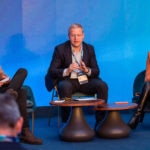Representatives of three leading organizations - Google, Telefónica and BBVA - spoke during the Open Summit event about the different applications of artificial intelligence (AI) in the business world and how to extract tangible value from data for people and for society as a whole, at a scale and in a structured way.

Systems capable of identifying exoplanets, algorithms to boost efficiency in network deployment operations, automatic translation tools or virtual assistants capable of recommending content. AI promises to bring a virtually limitless range of applications to organizations, and these are just some of the ones that Google and Telefónica are exploring through the use of machine learning techniques.
Despite progress in different fields, the big challenge now for companies is how to derive “tangible value” from AI applications for organizations, people and society at large. This was one of issues raised by Ricardo Martín Manjón, Global Head of Data in BBVA, during a panel discussion he moderated at the Open Summit event. Martín Manjón was joined on stage by Carlos Riquelme, AI research scientist at Google Research, and Elena Gil, Global Director for Big Data B2B at Telefonica Group and CEO at LUCA Data Driven Decisions.
Martín Manjón asked both experts about their views on the current status of their companies’ AI projects and about what companies can do to go from trials in controlled environments to “generate value at a scale.” According to Telefónica’s Elena Gil, the situation has greatly improved in recent years, and that these technologies have become a top priority for companies. "Data and artificial intelligence are at the core of Telefónica's digital transformation, and I believe they should be a top concern for almost all companies," she said.
In this sense, the Telefónica representative agreed that the great challenge for companies is to achieve scale. “And to achieve this, companies need to implement a highly structured strategy, where everything – from how data is accessed, to how it is ingested, to data governance models – is defined from the start at all levels of the organization. This is what’s going to allow to achieve scale,” she explained.
"In the coming years, a key artificial intelligence issue will be resolving regulatory and ethic quandaries"
The second factor that really helps companies is talent and cultural transformation. "On the one hand, it essential to have access to specialized teams that are sometimes not too big, because there is a shortage of this kind of profiles," she explained. In addition, it is not only necessary to assemble a team that exclusively focuses on these technologies, “but also to transform the rest of the company” because it is going to have to make decisions affecting multiple business areas. "Companies must tackle comprehensive structural changes; otherwise, their exploration efforts are never going to be more than merely anecdotal," Gil added.
For his part, Carlos Riquelme noted that sharing knowledge across the organization itself is another major challenge to ensure effective collaboration among the different areas involved in the development of the company’s artificial intelligence capabilities. "There’s about 100,000 people working at Google and this is a pressing challenge: we try to hold weekly chats, offer in-company training and carry out other initiatives to share what we are doing." The researcher explained that each engineer can devote 20 percent of their time to work on whatever projects they’re interested in, and that this also "helps foster collaboration" during the development of projects.

Carlos Riquelme (Google), Ricardo Martín Manjón (BBVA) and Elena Gil (Telefónica) talked about the challenges that the development of AI faces within big corporations and startups.
Looking ahead: A more ethical and transparent AI
Martín Manjón asked both speakers about the areas where they expect to see greater progress driven by artificial intelligence in the coming years. For Telefónica’s Elena Gil AI applications will enable major progress in the field of healthcare, with use cases and improvements that we still "can’t even imagine.” The executive added that in the coming years, another key artificial intelligence issue will be resolving regulatory quandaries. "The key challenge is to, as a society, build an ethical and regulatory framework that really allows artificial intelligence to develop to its fullest potential, but in a positive way," she said.
Riquelme also agreed about the need to make substantial progress at both legislative and ethical levels in the coming years. He also added that one of the fastest growing branches will be the so-called Explainable AI, an essential technology to help researchers understand what the decisions made by machine learning models’ are based on.
To illustrate this problem, Riquelme referred to one of Google's lines of research in the field of healthcare: a method to improve the prognosis of diabetic retinopathy, a disease that can cause blindness if undiagnosed and untreated. The expert explained that Google has developed an algorithm capable of predicting whether a patient is suffering the disease by analyzing an image of their retina. "Our results quickly reached the level of accuracy of a medical expert," he added.
However, through this line of research, the scientists also made an unexpected discovery: the algorithm they had developed was able to identify the patient's gender based on the retina image alone, something nobody knew could be done at the time. "This is a reflection of the extent to which machine learning is going to allow us to discover things we just are not aware of," Riquelme said. At the same time, this example illustrates the 'black box' challenge that comes with the use of these models; scientists have still not been able to figure out how the algorithm is able to determine the subject’s gender based on the image of their retina. "In the future, if we want machines to work with humans, humans have to be able to rely on the machines, to trust them." And for that, he explained, humans must be able to interpret the results that even the most complex algorithms offer.